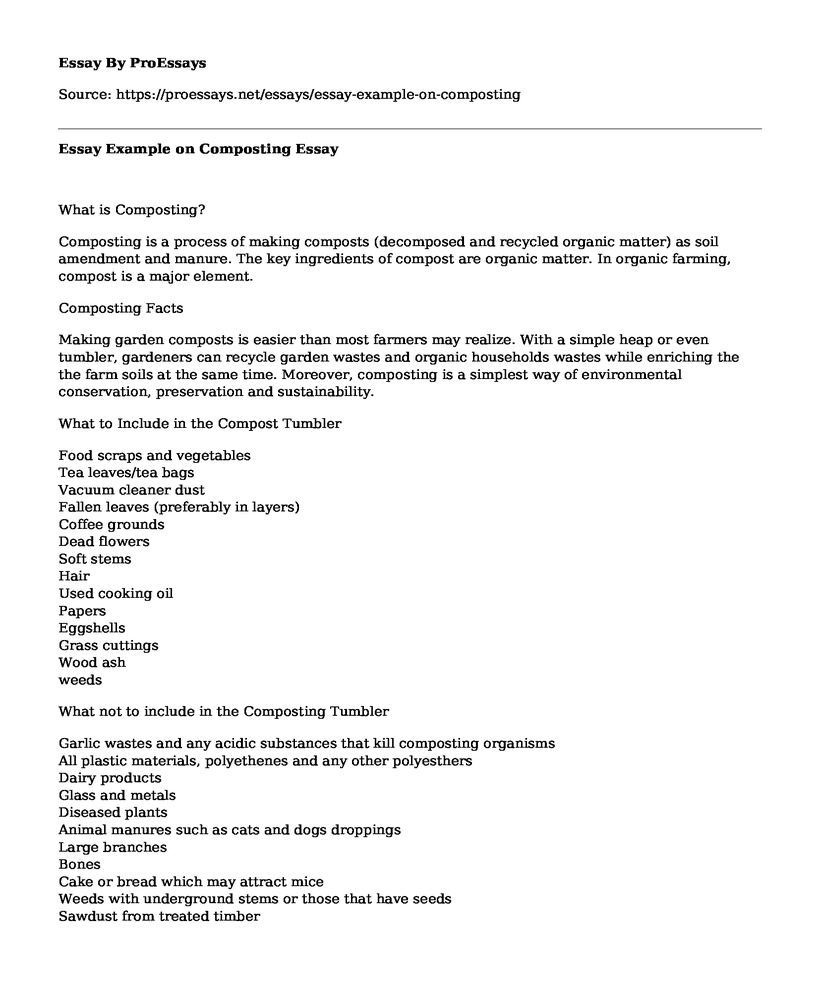What is Composting?
Composting is a process of making composts (decomposed and recycled organic matter) as soil amendment and manure. The key ingredients of compost are organic matter. In organic farming, compost is a major element.
Composting Facts
Making garden composts is easier than most farmers may realize. With a simple heap or even tumbler, gardeners can recycle garden wastes and organic households wastes while enriching the the farm soils at the same time. Moreover, composting is a simplest way of environmental conservation, preservation and sustainability.
What to Include in the Compost Tumbler
Food scraps and vegetables
Tea leaves/tea bags
Vacuum cleaner dust
Fallen leaves (preferably in layers)
Coffee grounds
Dead flowers
Soft stems
Hair
Used cooking oil
Papers
Eggshells
Grass cuttings
Wood ash
weeds
What not to include in the Composting Tumbler
Garlic wastes and any acidic substances that kill composting organisms
All plastic materials, polyethenes and any other polyesthers
Dairy products
Glass and metals
Diseased plants
Animal manures such as cats and dogs droppings
Large branches
Bones
Cake or bread which may attract mice
Weeds with underground stems or those that have seeds
Sawdust from treated timber
Significance of Composting
Composting practices turns organic garden wastes and food garbage into compost that you can; recycle valuable nutrients and save money, reduce the usage of artificial fertilizers, control greenhouse gas (GHG) emissions bypromoting the aerobic decomposition of organic materials, improve garden vitality and soil quality, and reduce the amount of wastes going to landfills.
What Decomposting Tumblers Do
A composting tumbler confines organic materials and regulates the conditions in the material in order to accelerate organic waste breakdown. Other than tumblers, a composting system can be a simple heap, old garbage bins or wooden boxes.
Composting Organisms Require:
Green ingredients which reproduce organisms necessary to oxidize carbon, brown ingredients which supply carbon for heat energy, oxygen necessary for oxidizing carbon, and water to moist the mixture for rapid composting process.
The Brief Process
Composting process require filling the tumbler, maintenance and troubleshooting (taking care of flies and odors, not composting materials, and soupy composts), finishing composting process (taking it to farms and gardens for soil enrichments).
The Benefits of Composting
There are numerous benefits which can be helpful to people if they embrace it. They include;
Composting assist in cleanup of contaminated soil. This is done by treating organic compounds, such as heating explosives and fuels and also absorbing odors. It also eradicated both non-chlorinated and chlorinated hydrocarbons.
Aerobic composting regenerates poor soil by producing bacteria and fungi which are important micro-organisms which improve the quality of soil.
Composting food wastes makes it decay efficiently and prevent the production of methane, a greenhouse gas to the environment.
Composted soil minimizes water that plants consume.
Pests and diseases affecting plants are also minimized; hence cutting down the costs fertilizers and other chemicals. This helps people to save and make money.
Cite this page
Essay Example on Composting. (2021, Apr 08). Retrieved from https://proessays.net/essays/essay-example-on-composting
If you are the original author of this essay and no longer wish to have it published on the ProEssays website, please click below to request its removal:
- Essay on Water and Sewage Treatment
- Argumentative Essay: Animal Testing Should Be Forbidden
- Water Pollution and Control Essay Example
- Essay Sample on The Environmental Impact of Dairy Industries: Finding Sustainable Alternatives
- The Growing Impact of Land Pollution: Essay Sample on Reducing Human Activity to Protect Our Environment
- EU ETS: EU's Tool to Combat Climate Change - Essay Sample
- Essay Example on Auditory System: Sensory Organs, Motion Tasks, and Cortex







